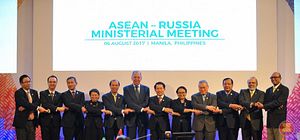The 50th Association of Southeast Asian Nations ministerial meeting held in Manila, Philippines, issued its final joint communique on August 5, calling for “non-militarisation and self-restraint” in South China Sea while refraining from directly addressing disputes with China.
Meanwhile, China’s foreign ministry published a series of statements and remarks regarding the China-ASEAN relations and the joint communique. On August 8, Chinese Foreign Minister Wang Yi praised in particular that the communique was very comprehensive and that it showed all parties’ confidence in the prospects for China-ASEAN relations.
On August 3, before Wang was to attend the summit, China’s foreign ministry had already sent positive signals toward the ASEAN summit. Foreign Ministry Spokesperson Geng Shuang claimed that “China is willing to join hands with ASEAN countries to uphold the stability of the South China Sea.”
On August 6, Wang called the summit a “successful meeting with very positive and friendly atmosphere” in a press conference in Manila. Wang added that the China- ASEAN strategic partnership has “entered a new stage of comprehensive development. ”
In detail, Wang explained that ASEAN had adopted the seven proposals China suggested:
- To formulate the 2030 Vision of China-ASEAN strategic partnership;
- To seek greater synergy between the Belt and Road initiative and the development strategies of ASEAN;
- To identify the year of 2018 as the “China-ASEAN Innovation Year” for cooperation on innovation-driven development;
- To accelerate the implementation of the China-ASEAN Free Trade Area;
- To fully carry on the “China-ASEAN Cooperation On Production Capacity” to boost each other’s industrialization processes;
- To enhance cultural exchanges and tourism cooperation;
- And to speed up the negotiation on Regional Comprehensive Economic Partnership (RCEP) for regional integration.
It is obvious that the majority of China’s proposals centered around economic cooperation and trade integration.
In terms of the most sensitive topic, the South China Sea, China is also satisfied with the final result in the joint communique.
On August 8, China’s foreign ministry published Wang Yi’s remarks on the communique in particular. Wang said:
Every year, the joint communique would publish contents related to the South China Sea, but this year change has been made: first, the length of related contents is significantly shorter than in the past; Second, the ASEAN countries have…approved the South China Sea Code of Conduct (COC) framework with China and showed a positive attitude toward the next step’s specific consultation.
The joint communique did say that some ministers had expressed concerns “on the land reclamations and activities” in the South China Sea. In reply, Wang emphasized that “actually only one or two ministers expressed concerns.” Furthermore, Wang pointed out that “China has completed the landfill two years ago. So, if there is any country carrying on land reclamation, it is definitely not China.”
Based on Wang’s reply, it seems that China viewed its performance at the ASEAN Regional Forum this year a total diplomatic success.

































